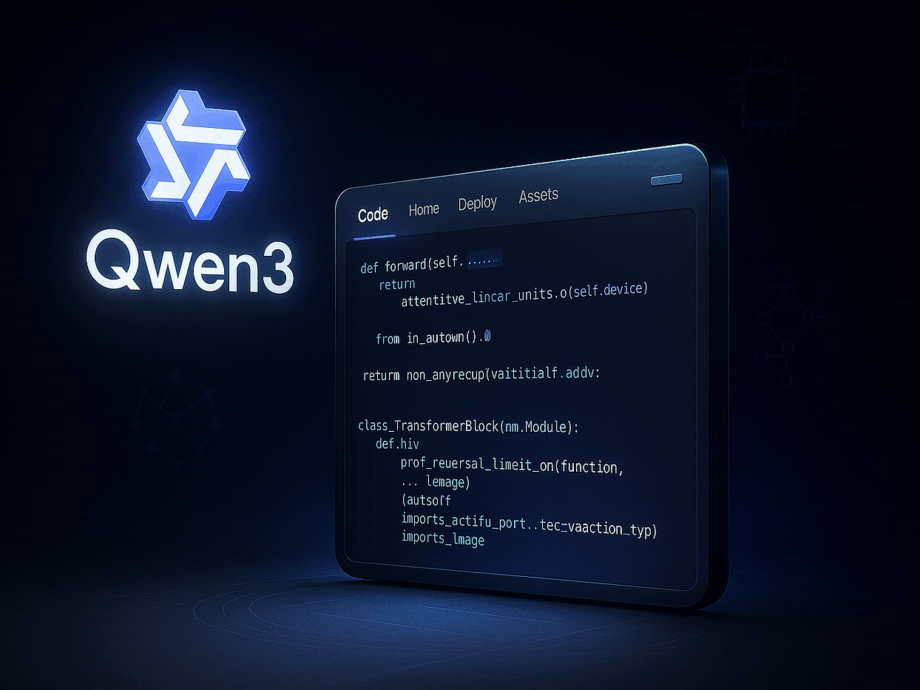Alibaba’s Qwen3-Coder: A New Era for Open-Source AI Coding
Alibaba has made a bold move in the artificial intelligence (AI) landscape with the release of Qwen3-Coder, a groundbreaking open-source AI model designed to automate and enhance software development. With its massive scale, advanced architecture, and agentic capabilities, Qwen3-Coder is already being hailed as a game-changer for developers worldwide, challenging the dominance of proprietary models from tech giants like OpenAI, Anthropic, and Google.
- Alibaba’s Qwen3-Coder: A New Era for Open-Source AI Coding
- What Makes Qwen3-Coder Unique?
- How Does Qwen3-Coder Work?
- Qwen Code CLI: Empowering Developers
- Open-Source Strategy: Alibaba’s Vision and Global Impact
- Strengths and Limitations: A Balanced View
- Security and Trust: The Debate Over Open-Source AI from China
- Real-World Impact: Developer Experiences and Community Response
- Broader Implications: The Future of AI-Powered Software Development
- In Summary
But what exactly is Qwen3-Coder, how does it work, and why is it sparking both excitement and debate across the global tech community? This article explores the technology, its real-world impact, and the broader implications for the future of software engineering.
What Makes Qwen3-Coder Unique?
At the heart of Qwen3-Coder’s innovation is its Mixture-of-Experts (MoE) architecture. The model boasts a staggering 480 billion parameters, but only activates 35 billion per inference, optimizing both performance and computational efficiency. This approach allows Qwen3-Coder to tackle complex coding tasks without the prohibitive hardware requirements typically associated with models of this size.
Qwen3-Coder is not just another code completion tool. It is built for agentic coding—meaning it can autonomously manage multi-step programming tasks, interact with developer tools, and even debug or refactor entire codebases. Its native context window of 256,000 tokens (scalable up to 1 million) enables it to process vast projects in a single session, making it suitable for enterprise-scale software engineering and research.
Developers can access Qwen3-Coder through multiple channels, including the Qwen Chat interface, the open-source Qwen Code command-line tool, and APIs on platforms like Hugging Face and Alibaba’s Model Studio. The model supports integration with popular developer environments and is available under a fully open-source license, allowing modification and redistribution without fees.
Agentic Coding: Beyond Code Generation
Traditional AI coding assistants focus on code completion or snippet generation. Qwen3-Coder, however, is designed for agentic execution. It can:
- Generate new code from scratch for full-stack applications
- Debug and refactor existing codebases
- Automate repetitive workflows, such as documentation and testing
- Interact with external tools and APIs for multi-step tasks
This agentic approach is powered by advanced reinforcement learning techniques, enabling the model to reason through complex problems and adapt to real-world developer workflows.
How Does Qwen3-Coder Work?
Qwen3-Coder’s architecture is a technical marvel. It uses 160 experts within its MoE framework, activating 8 per inference. This design allows the model to scale efficiently, delivering high performance without overwhelming hardware demands. The model is trained on a massive dataset—over 7.5 trillion tokens, with 70% code and 30% general text—ensuring broad language and domain coverage.
Key technical features include:
- Long Context Window: Supports 256,000 tokens natively, extendable to 1 million, enabling analysis of large codebases and documents.
- Multi-Language Support: Proficient in 358 programming and markup languages, including Python, JavaScript, Java, C++, Go, and Rust.
- Reinforcement Learning: Utilizes both execution-based and long-horizon reinforcement learning to improve code reliability and agentic task performance.
- Open-Source Tooling: Qwen Code CLI, adapted from Gemini Code, offers natural language command support and integrates with editors, CI/CD pipelines, and cloud platforms.
These capabilities make Qwen3-Coder not just a tool for code generation, but a foundation for autonomous software development agents.
Benchmarks and Real-World Performance
On industry-standard benchmarks, Qwen3-Coder delivers impressive results. For example, on SWE-Bench Verified—a test of AI models’ ability to resolve real-world software issues—Qwen3-Coder matches or outperforms leading proprietary models:
- Claude-Sonnet-4: 70.4% (500 turns)
- Qwen3-Coder: 69.6% (500 turns)
- Kimi-K2: 65.4%
- GPT-4.1: 54.6%
- Gemini-2.5-Pro: 49.0%
These results highlight Qwen3-Coder’s ability to compete with, and in some cases surpass, the best closed-source models available.
In practical developer testing, Qwen3-Coder has demonstrated the ability to “one-shot” complex tasks, such as implementing permissions systems or refactoring large codebases, with high accuracy and minimal manual intervention. Its performance has been described as “a big win for the open source community,” with some users noting it rivals paid models like Claude Sonnet 4 and Gemini.
Qwen Code CLI: Empowering Developers
Alongside the model, Alibaba has released Qwen Code, an open-source command-line interface (CLI) tool designed to unlock Qwen3-Coder’s full potential. Built for Node.js and installable via npm, Qwen Code enables developers to:
- Delegate programming tasks to AI using natural language
- Automate code optimization, refactoring, and documentation
- Integrate with APIs, editors, and CI/CD systems
- Configure workflows using environment variables and custom prompts
Qwen Code’s flexibility allows it to fit seamlessly into modern development stacks, supporting everything from small projects to enterprise-scale systems. It also supports integration with Claude Code and other community tools, providing developers with a wide range of options for agentic coding.
Open-Source Strategy: Alibaba’s Vision and Global Impact
Alibaba’s decision to open-source Qwen3-Coder is part of a broader strategy to democratize access to advanced AI technology. The company operates China’s largest open-source AI community, ModelScope, which now hosts over 70,000 models and serves millions of developers worldwide. By releasing Qwen3-Coder and Qwen Code under open licenses, Alibaba aims to:
- Lower barriers for startups and small businesses to adopt AI
- Foster global collaboration and innovation in software development
- Provide an alternative to subscription-based, closed-source coding assistants
According to Alibaba, Qwen-based coding models have been downloaded over 20 million times globally. The company’s existing coding assistant, Tongyi Lingma, has generated more than 3 billion lines of code since June 2024 and will soon be upgraded with Qwen3-Coder’s enhanced agentic capabilities.
Industry Context: The Race for AI Coding Assistants
The launch of Qwen3-Coder comes amid fierce competition in the AI coding assistant market. Tech giants like Microsoft, OpenAI, Google, and Amazon have invested heavily in proprietary tools such as GitHub Copilot and Gemini Code. However, regulatory barriers and growing demand for transparency have fueled interest in open-source alternatives, especially in China and other regions seeking technological independence.
Alibaba’s open-source approach stands in contrast to the subscription-based models of its Western rivals, potentially appealing to developers and organizations wary of vendor lock-in or seeking greater control over their development tools.
Strengths and Limitations: A Balanced View
Qwen3-Coder’s strengths are clear:
- Scalability: Handles massive codebases and long documents with ease
- Agentic Capabilities: Automates multi-step workflows, not just code snippets
- Open-Source Flexibility: Customizable, transparent, and free from licensing fees
- Multi-Language Proficiency: Supports hundreds of programming and markup languages
- Integration: Works with popular developer tools, editors, and cloud platforms
However, the model is not without its limitations. Reviews and technical analyses have noted:
- Occasional Errors: Minor bugs or logic errors may require manual correction
- Spatial Reasoning: Struggles with advanced spatial tasks, such as 3D simulations or robotics
- Censorship and Bias: Sometimes over-censors or provides neutral responses in nuanced scenarios
- Resource Requirements: While efficient for its size, running the full model locally is impractical for most users; cloud or API access is often necessary
- Cost Considerations: API usage can become expensive for large or frequent tasks, compared to subscription-based services
Despite these challenges, Qwen3-Coder represents a significant leap forward for open-source AI coding, offering a viable alternative to closed-source solutions and empowering developers to build more autonomous and efficient workflows.
Security and Trust: The Debate Over Open-Source AI from China
While Qwen3-Coder’s technical achievements are widely recognized, its adoption in the West has sparked debate over security and trust. Some experts warn that AI-generated code could introduce subtle vulnerabilities, especially if the underlying model or infrastructure is not fully transparent.
Concerns include:
- Potential for Hidden Vulnerabilities: AI-generated code may contain flaws that are difficult to detect, raising the risk of supply chain attacks or long-term infiltration.
- Data Exposure: Using cloud-based AI tools could inadvertently reveal proprietary algorithms or sensitive infrastructure details.
- Regulatory Risks: China’s National Intelligence Law requires companies like Alibaba to cooperate with government requests, including access to AI models and user data.
- Autonomous Agent Risks: Agentic AI tools can act independently, making decisions or changes without direct oversight, which could be dangerous if misused.
Jurgita Lapienytė, Chief Editor at Cybernews, cautioned,
“We may be sleepwalking into a future where critical systems are built with compromised code.”
Others argue that open-source competition is healthy and that transparency can help mitigate risks. However, the debate highlights the need for robust security tools, regulatory oversight, and careful evaluation of AI coding assistants—regardless of their origin.
Real-World Impact: Developer Experiences and Community Response
Early adopters of Qwen3-Coder have reported positive experiences, particularly in handling complex, real-world coding tasks. One developer shared that Qwen3-Coder was able to “one-shot” the implementation of a permissions system in a large web project, outperforming other open models and rivaling paid solutions like Claude Sonnet 4.
However, some users noted that API-based usage can become costly for large-scale tasks, and that running the full model locally is not feasible for most individuals due to hardware constraints. Despite these trade-offs, the consensus is that Qwen3-Coder marks a major milestone for the open-source community, offering capabilities that were previously exclusive to proprietary models.
Broader Implications: The Future of AI-Powered Software Development
Qwen3-Coder’s release signals a shift toward more autonomous, efficient, and accessible software development. By enabling agentic coding at scale, the model empowers developers to:
- Accelerate project timelines by automating routine tasks
- Improve code quality through advanced analysis and testing
- Collaborate more effectively across large teams and codebases
- Experiment with new workflows and integrations, driving innovation
Alibaba’s commitment to open-source AI is also fostering global collaboration and lowering barriers for startups and small businesses to access cutting-edge technology. As the AI coding assistant market continues to evolve, Qwen3-Coder sets a new standard for what open-source models can achieve.
In Summary
- Alibaba’s Qwen3-Coder is a 480B-parameter open-source AI model designed for agentic coding and autonomous software development.
- The model features a Mixture-of-Experts architecture, long context window (up to 1 million tokens), and supports 358 programming languages.
- Qwen3-Coder matches or outperforms leading proprietary models on key benchmarks, including SWE-Bench Verified.
- Developers can access the model via Qwen Chat, Qwen Code CLI, Hugging Face, and Alibaba’s Model Studio APIs.
- Strengths include scalability, agentic capabilities, open-source flexibility, and integration with modern developer tools.
- Limitations include occasional errors, spatial reasoning challenges, resource requirements, and potential security concerns.
- Security and trust issues have been raised, particularly regarding data exposure and regulatory risks associated with Chinese-developed AI.
- Qwen3-Coder is driving a new era of open-source AI coding, empowering developers and fostering global innovation in software engineering.












